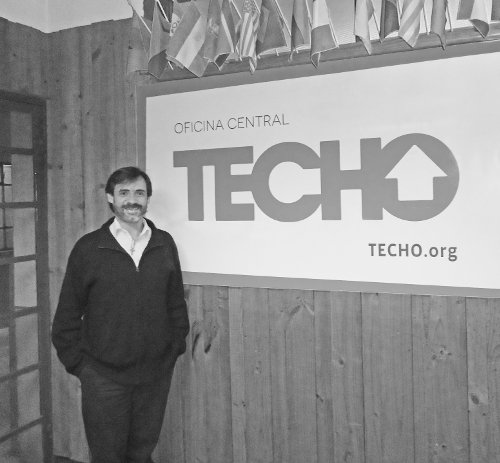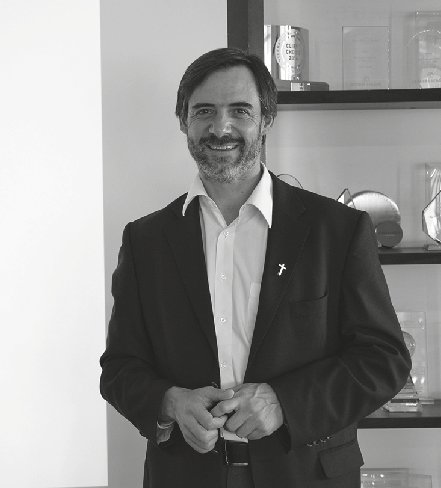MEDICAL SPECIALTIES IN EXTREME ZONES:
“We have changed the lives of 147,000 families”
Fundación Acrux conducted its first operation in 2003, to have the waiting lists for medical attention shorten throughout the country’s hospitals. The foundation comprises nearly 3,000 medical volunteers willing and ready to travel to the remotest places in Chile, to render their medical services to patients in need of them there.
How did the idea of creating Fundación Acrux come about?
I have always worked in health, but always in the private sector. I had never done it from the public sector. Nearly 20 years ago, we made a presentation for some doctors in order to assist poorer individuals. That is when we were born, and began realizing how huge the problem of waiting lists was. In the private sector, anyone makes a phone call and secures an appointment, and the greatest issue might be, for instance, having to settle for an appointment with your dermatologist for a month and half later. Instead, in the public sector, on average, the wait is of 1.5 to 2 years, because there are no specialists to cover the demand.
In seeing this reality, I decided to gather a group of doctors, and we went ahead with our first field operation. It took place during a winter morning in the borough of Pudahuel, at Noviciado, a completely rural area. There were three doctors, a gynaecologist, an echography technician, and a paediatrician, calling on people through a loudspeaker from a lorry. People reacted and responded to the call to be able to get medical attention. During that field operation we managed to have a TV channel cover it, specifically the morning show “Buenos días a Todos” [Good morning, everyone], and so we did all of this while being broadcast live. I recall this lady, 52 years old, who had never seen a gynaecologist.
After that, a woman called the TV channel, saying she had cancer, and that she had been told she needed a hysterectomy, but that she had been waiting three years for an ultrasound. They contacted us once again, and we immediately saw her. In the end, what she believed to be a tumour was, in fact, a cyst, nothing malignant. And so, being able to solve that waiting, and having us see her and prescribe treatment in 5 minutes… that motivated me to go on. That is when I thought that everything was possible.
We then organised another field operation for Recoleta and Santiago, but smaller, from 8 a.m. till noon, and we continued thus until the Navy contacted me and asked whether we could do a field operation for Puerto Natales. We were twenty doctors, and we realised the need for specialists was unbelievable. Pregnant women had to leave for Punta Arenas three months before labour, because the road freezes and they could not risk not making it on time. Plus, there is no maternity ward in Natales. That is how I detected a series of cases such as those, and decided I wanted to formalise the foundation. We were incorporated in 2013. We began going to various places, made an alliance with the Navy, the Ministry of Health, and other institutions.
How are requests filed?
We see it directly with the Ministry of Health and the Health Services. We present them with our planning and scheduling and they let us know where to go. Once the place has been defined, I contact the Ministry of Health and let them know the dates; we take the specialists needed. In April this year we had a field operation for Arica. We took 42 doctors, vascular surgeons, endoscopy technicians, general practitioners, everything. Last year we realised that the waiting lists in Arica were the same as in 2020. We managed to shorten those lists by 25%, leaving them in just one year. That same weekend, with 68 doctors, we visited Punta Arenas, Puerto Edén, Cerro Castillo, Porvenir, and Puerto Natales. In other words, we had two simultaneous field operations in the northernmost and southernmost regions of Chile.
The biggest operation we have conducted took place in Arica, as well. We took 147 doctors and saw nearly 16,000 patients over the course of four days.
And, at the beginning, were you visiting the same places?
Yes. Whenever we went back, after a year, we encountered those people again waiting to get a medical appointment, because of the lack of equipment. That was another issue. So we approached companies such as Phillips and Siemens, and got endoscopic and other types of equipment, and that is how we started growing.
What is the scope of the Foundation nowadays?
We currently have 998 doctors available in our network and, what is more important, they all do this as volunteer work. We have an alliance with Empresas Banmédica, which has health centres that overall have another 2,000 doctors, so I can safely say we now have 2,998 medical volunteers available. Some of them travel with us twice or thrice a year, others feel motivated when they learn about us. In short, this is a union of wills.
There are several players with a role throughout this network: the Government with the Health Services, governors in each region, companies, labs, and doctors, who all come together for this cause. The doctors, many of whom studied for free, tell us that this is a way of giving back. That is the underlying philosophy of Acrux, it is a way of repaying, of giving back.
Up to date, we have conducted nearly 153 field operations. We organise them for the weekend, Friday afternoon, Saturday, and Sunday morning, so that the health system does not resent it, since we see patients in the same hospitals. For example, we arrive in Antofagasta with 50 doctors, and they settle themselves at the clinic, without saturating the system. We have catered to the needs of 147,000 patients, and we believe that translates into having contributed to a life change for 147,000 families. We even offer surgeries nowadays.
How has Carey counselled you?
At some point we had to sign an international agreement, so we had to do a due diligence, and that is when we required lawyers. My daughter, who used to work at Carey, got me in touch with the firm and we began working with you as pro bono clients. I have to say, I have always received the greatest of services, you always come back with an answer within the same day, I really feel supported, as though I was one of the firm’s huge clients. -Roberto, I’ll call you at 6-. And by 6 they already have the issue solved. It’s just great!
Where in Chile have you detected more need?
All over Chile, but normally our mission revolves around the northernmost and southernmost areas, where there are no specialists. The biggest needs I have come across are in Chiloé. There are many islands, and people cannot travel. Other complex areas include Porvenir, Aysén, Chile Chico, Puerto Cisnes, and Cochrane. We have lately visited Perquenco, Galvarino, and Ercilla. Regardless of the many issues there are in the area, we have gone there, and have faced no trouble. I do not know whether that is owed to the good we are doing, or because people understand there are health needs.
What would you say is the most rewarding part of having created this foundation?
I am giving back what I have been given. I believe am blessed, favoured by God. Each field operation entails great physical exhaustion, but also joy and satisfaction for the soul, something wonderful. Each time we end up feeling as though we have a chubby soul, and ready for the next field trip. In the chat we have with the participating doctors they write: So, when do we see each other again?, or hey! You haven’t called me! Why? There are always volunteers.
What are your projects for the future?
The problem of waiting lists is a dynamic one. In four more years you will again hear about some issue that is not easily solved, and which grows in numbers and waiting time every so often. For the future, our project is to continue to be an institution that can contribute to shorten those waiting lists, increasing the number of patients seen, the medical services rendered, the number of medical field operations we conduct in a year, and the number of doctors and members that partner with us. Our main project for the future is to be acknowledged as one of the most relevant institutions in the performance of medical field operations to solve the country’s waiting lists. Our daily work focuses on that paramount goal.
The other thing is that Chile is a maritime country, a country with a vast coastline, and the ideal situation would be to have a hospital ship, something other countries do have, for it to go all over the country. That would be a huge help. I am thinking of Arica, Iquique, Antofagasta. With that we would be able to expand the offer of health services. Spain and the U.S. have that sort of ship. But the obstacle is the budget. A hospital ship like the one we want costs about USD$80 million. We are lacking that green light. It is a target we want to achieve, though it does go far beyond our daily tasks.
To learn more about Fundación Acrux, check this video: https://youtu.be/sLK2-b246jA





